-
 Bitcoin
Bitcoin $114400
1.32% -
 Ethereum
Ethereum $3499
2.20% -
 XRP
XRP $2.922
4.26% -
 Tether USDt
Tether USDt $0.0000
0.03% -
 BNB
BNB $752.6
1.53% -
 Solana
Solana $161.8
1.64% -
 USDC
USDC $0.9999
0.01% -
 TRON
TRON $0.3267
1.32% -
 Dogecoin
Dogecoin $0.1991
3.02% -
 Cardano
Cardano $0.7251
3.29% -
 Hyperliquid
Hyperliquid $38.32
3.36% -
 Stellar
Stellar $0.3972
7.58% -
 Sui
Sui $3.437
2.74% -
 Chainlink
Chainlink $16.29
3.65% -
 Bitcoin Cash
Bitcoin Cash $545.3
3.70% -
 Hedera
Hedera $0.2482
7.49% -
 Ethena USDe
Ethena USDe $1.001
0.03% -
 Avalanche
Avalanche $21.40
2.02% -
 Toncoin
Toncoin $3.579
1.56% -
 Litecoin
Litecoin $109.3
2.20% -
 UNUS SED LEO
UNUS SED LEO $8.951
-0.18% -
 Shiba Inu
Shiba Inu $0.00001220
2.75% -
 Polkadot
Polkadot $3.613
2.99% -
 Uniswap
Uniswap $9.173
3.78% -
 Monero
Monero $302.6
2.62% -
 Dai
Dai $0.0000
0.00% -
 Bitget Token
Bitget Token $4.320
1.52% -
 Pepe
Pepe $0.00001048
3.40% -
 Cronos
Cronos $0.1314
4.33% -
 Aave
Aave $259.4
3.54%
How does brand collaboration in the NFT market affect the market?
Brand collaborations boost NFT market dynamics by increasing demand, enhancing legitimacy, and attracting diverse audiences, though they come with regulatory and volatility risks.
Apr 05, 2025 at 12:28 pm
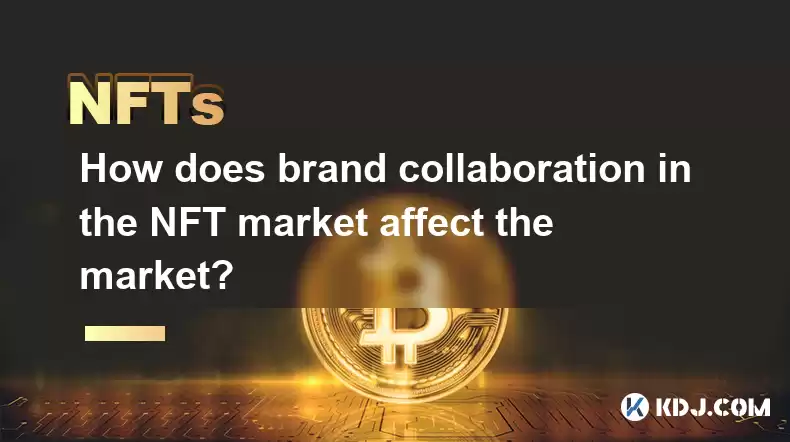
The NFT market has seen a surge in brand collaborations, which have significantly influenced the market dynamics. These collaborations bring together established brands and the burgeoning world of NFTs, creating unique opportunities for both parties. When a well-known brand enters the NFT space, it often brings its existing audience, which can lead to increased interest and investment in NFTs. This influx of new participants can drive up demand and, consequently, the value of NFTs. Additionally, brand collaborations can enhance the perceived legitimacy and value of NFTs, as consumers tend to trust products associated with reputable brands.
Impact on NFT Valuation
Brand collaborations in the NFT market can directly impact the valuation of NFTs. When a popular brand launches an NFT collection, the perceived value of these NFTs often increases due to the brand's reputation and following. For instance, if a luxury fashion brand like Gucci releases an NFT collection, the demand for these NFTs can skyrocket due to the brand's prestige. This increased demand can lead to higher prices, making the NFTs more valuable. Moreover, the collaboration can set a precedent for future NFT projects, influencing how other brands approach the market and how investors perceive the potential of NFTs.
Market Expansion and Diversification
Brand collaborations can also lead to the expansion and diversification of the NFT market. By partnering with brands from various industries, the NFT market can attract a broader audience. For example, a collaboration between a sports brand and an NFT platform can draw in sports enthusiasts who may not have previously been interested in NFTs. This diversification can help stabilize the market by reducing its reliance on a single demographic or type of NFT. It also opens up new avenues for creativity and innovation, as brands bring their unique perspectives and ideas to the NFT space.
Enhanced Marketing and Exposure
Collaborations between brands and NFT platforms provide significant marketing and exposure benefits. When a brand with a large following enters the NFT market, it can leverage its existing marketing channels to promote its NFT offerings. This can lead to increased visibility for the NFT platform and its other projects. Additionally, the buzz generated by a high-profile collaboration can attract media attention, further boosting the exposure of NFTs. This increased exposure can lead to more participants in the NFT market, driving up demand and potentially leading to higher valuations for NFTs.
Challenges and Risks
While brand collaborations can bring many benefits to the NFT market, they also come with challenges and risks. One major challenge is ensuring that the collaboration aligns with the brand's values and image. A mismatch can lead to negative publicity and damage the brand's reputation. Additionally, the volatile nature of the NFT market can pose risks for brands entering this space. If the market experiences a downturn, the value of the brand's NFTs could decrease, potentially leading to financial losses. Brands must carefully consider these risks and develop strategies to mitigate them before entering the NFT market.
Case Studies of Successful Brand Collaborations
Several brand collaborations in the NFT market have proven to be successful. One notable example is the collaboration between Nike and RTFKT, a digital fashion company. Nike's acquisition of RTFKT allowed the brand to enter the NFT space and launch its own NFT collection, which was met with significant demand. Another example is the collaboration between Adidas and Bored Ape Yacht Club, which resulted in the launch of the "Into the Metaverse" NFT collection. These collaborations not only increased the value of the NFTs but also brought more attention to the NFT market as a whole.
Consumer Trust and Engagement
Brand collaborations can enhance consumer trust and engagement in the NFT market. When a trusted brand enters the NFT space, it can reassure consumers about the legitimacy and potential of NFTs. This increased trust can lead to higher engagement, as consumers are more likely to participate in NFT projects associated with reputable brands. Additionally, brands can use their existing customer relationships to engage with their audience in new ways, such as through exclusive NFT drops or virtual experiences. This can foster a sense of community and loyalty among consumers, further driving engagement in the NFT market.
Influence on Future NFT Projects
Brand collaborations can set the stage for future NFT projects by demonstrating the potential of NFTs to other brands and investors. When a successful collaboration results in high demand and increased valuations, it can encourage other brands to explore the NFT market. This can lead to a proliferation of new NFT projects, further expanding the market. Additionally, successful collaborations can provide valuable insights into what works and what doesn't in the NFT space, helping to shape the strategies of future projects. This influence can drive innovation and growth in the NFT market, making it more dynamic and competitive.
Regulatory Considerations
As brand collaborations in the NFT market become more common, regulatory considerations become increasingly important. Brands must navigate the complex regulatory landscape surrounding NFTs, which can vary by jurisdiction. This includes understanding the legal implications of issuing NFTs, such as potential securities regulations, and ensuring compliance with anti-money laundering (AML) and know-your-customer (KYC) requirements. Brands must also consider the intellectual property rights associated with their NFTs, as well as any potential tax implications. Navigating these regulatory challenges is crucial for brands to successfully enter and operate in the NFT market.
Technological Integration
Brand collaborations in the NFT market often involve significant technological integration. Brands must work with NFT platforms to ensure seamless integration of their products into the digital space. This can include developing user-friendly interfaces for purchasing and managing NFTs, as well as integrating blockchain technology to ensure the security and authenticity of the NFTs. Additionally, brands may need to develop new technologies or adapt existing ones to create unique NFT experiences for their customers. This technological integration is essential for the success of brand collaborations in the NFT market, as it enhances the user experience and adds value to the NFTs.
Community Building and Loyalty Programs
Brand collaborations in the NFT market can also be used to build communities and enhance loyalty programs. By offering exclusive NFTs to their customers, brands can create a sense of exclusivity and reward loyalty. These NFTs can provide access to special events, virtual experiences, or other perks, fostering a stronger connection between the brand and its customers. Additionally, brands can use NFTs to build communities around their products, encouraging engagement and interaction among their customers. This community-building aspect can enhance the overall value of the NFTs and strengthen the brand's relationship with its audience.
Market Trends and Future Outlook
The trend of brand collaborations in the NFT market is expected to continue, driven by the potential benefits for both brands and the NFT market. As more brands recognize the value of NFTs, we can expect to see an increase in collaborations across various industries. This trend is likely to lead to further innovation and growth in the NFT market, as brands bring new ideas and audiences to the space. However, the future outlook also depends on the market's ability to navigate challenges such as regulatory hurdles and market volatility. Brands and NFT platforms must work together to address these challenges and ensure the continued success of brand collaborations in the NFT market.
Common Questions and Answers
Q: How do brand collaborations affect the valuation of NFTs?
A: Brand collaborations can increase the valuation of NFTs by bringing in new audiences and enhancing the perceived legitimacy and value of the NFTs. When a reputable brand launches an NFT collection, the demand for these NFTs often increases, leading to higher prices.
Q: What are the benefits of brand collaborations for the NFT market?
A: Brand collaborations can expand and diversify the NFT market, enhance marketing and exposure, increase consumer trust and engagement, and set the stage for future NFT projects. These collaborations can bring new participants to the market and drive innovation and growth.
Q: What are the challenges and risks associated with brand collaborations in the NFT market?
A: Challenges and risks include ensuring alignment with the brand's values and image, navigating the volatile nature of the NFT market, and addressing regulatory considerations. Brands must carefully assess these risks and develop strategies to mitigate them.
Q: Can you provide examples of successful brand collaborations in the NFT market?
A: Successful examples include the collaboration between Nike and RTFKT, which led to the launch of Nike's NFT collection, and the collaboration between Adidas and Bored Ape Yacht Club, resulting in the "Into the Metaverse" NFT collection. These collaborations increased the value of the NFTs and brought more attention to the NFT market.
Q: How do brand collaborations influence future NFT projects?
A: Successful brand collaborations can encourage other brands to explore the NFT market, leading to a proliferation of new NFT projects. They also provide valuable insights into what works in the NFT space, helping to shape the strategies of future projects and drive innovation and growth in the market.
Q: What role does technology play in brand collaborations in the NFT market?
A: Technology plays a crucial role in ensuring seamless integration of brand products into the digital space. This includes developing user-friendly interfaces, integrating blockchain technology for security and authenticity, and creating unique NFT experiences for customers.
Q: How can brand collaborations enhance consumer trust and engagement in the NFT market?
A: Brand collaborations can enhance consumer trust by associating NFTs with reputable brands, reassuring consumers about the legitimacy and potential of NFTs. They can also increase engagement by offering exclusive NFTs and fostering a sense of community and loyalty among customers.
Q: What regulatory considerations should brands be aware of when entering the NFT market?
A: Brands should be aware of potential securities regulations, anti-money laundering (AML) and know-your-customer (KYC) requirements, intellectual property rights, and tax implications. Navigating these regulatory challenges is crucial for successful entry into the NFT market.
Q: How can brand collaborations be used to build communities and enhance loyalty programs?
A: Brands can use NFTs to create exclusive rewards and experiences for their customers, fostering a sense of exclusivity and loyalty. NFTs can also be used to build communities around brand products, encouraging engagement and interaction among customers.
Q: What is the future outlook for brand collaborations in the NFT market?
A: The trend of brand collaborations in the NFT market is expected to continue, driven by the potential benefits for both brands and the NFT market. However, the future outlook also depends on the market's ability to navigate challenges such as regulatory hurdles and market volatility.
Disclaimer:info@kdj.com
The information provided is not trading advice. kdj.com does not assume any responsibility for any investments made based on the information provided in this article. Cryptocurrencies are highly volatile and it is highly recommended that you invest with caution after thorough research!
If you believe that the content used on this website infringes your copyright, please contact us immediately (info@kdj.com) and we will delete it promptly.
- Cryptocurrency, Altcoins, and Profit Potential: Navigating the Wild West
- 2025-08-04 14:50:11
- Blue Gold & Crypto: Investing Disruption in Precious Metals
- 2025-08-04 14:30:11
- Japan, Metaplanet, and Bitcoin Acquisition: A New Era of Corporate Treasury?
- 2025-08-04 14:30:11
- Coinbase's Buy Rating & Bitcoin's Bold Future: A Canaccord Genuity Perspective
- 2025-08-04 14:50:11
- Coinbase's Buy Rating Maintained by Rosenblatt Securities: A Deep Dive
- 2025-08-04 14:55:11
- Cryptos, Strategic Choices, High Returns: Navigating the Meme Coin Mania
- 2025-08-04 14:55:11
Related knowledge
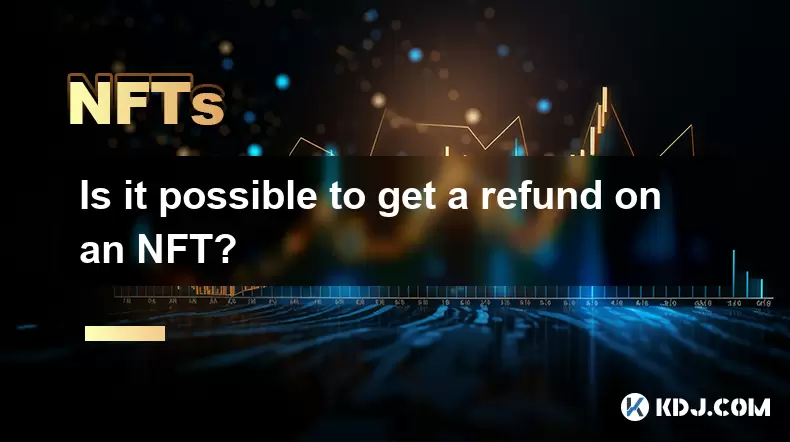
Is it possible to get a refund on an NFT?
Jul 21,2025 at 08:35pm
Understanding NFT Transactions and RefundsWhen you purchase an NFT (Non-Fungible Token), the transaction is typically recorded on a blockchain, making...
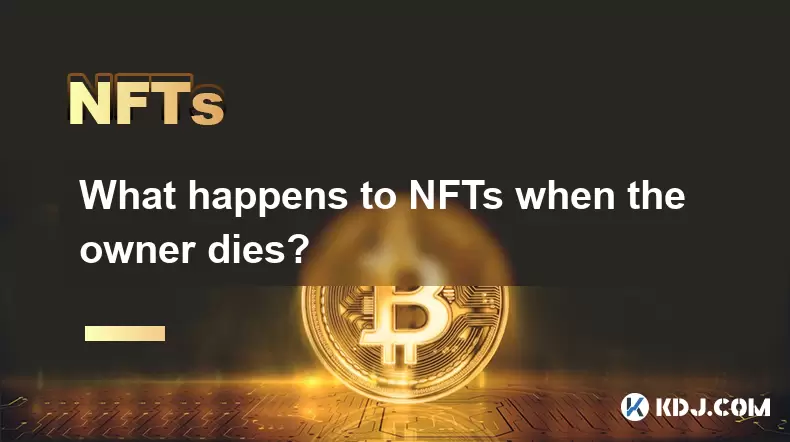
What happens to NFTs when the owner dies?
Jul 22,2025 at 02:43pm
Legal Ownership and Digital AssetsWhen an individual owns NFTs, the question of what happens to these assets upon their death is a pressing one. NFTs ...
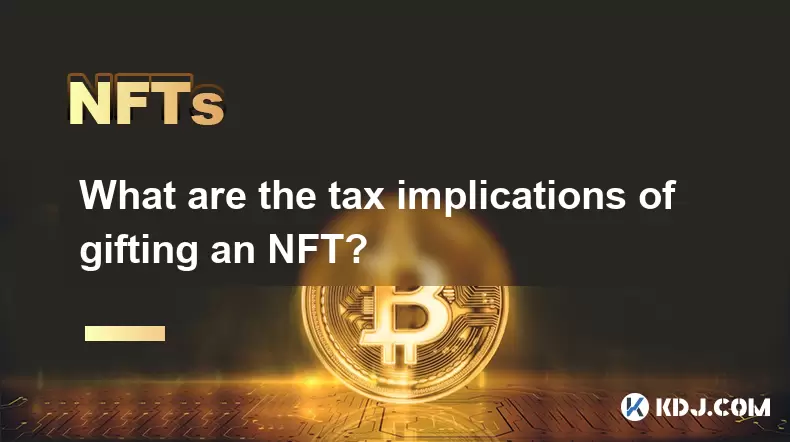
What are the tax implications of gifting an NFT?
Jul 19,2025 at 04:21am
Understanding the Basics of NFT GiftingGifting a Non-Fungible Token (NFT) involves transferring ownership from one individual to another without recei...
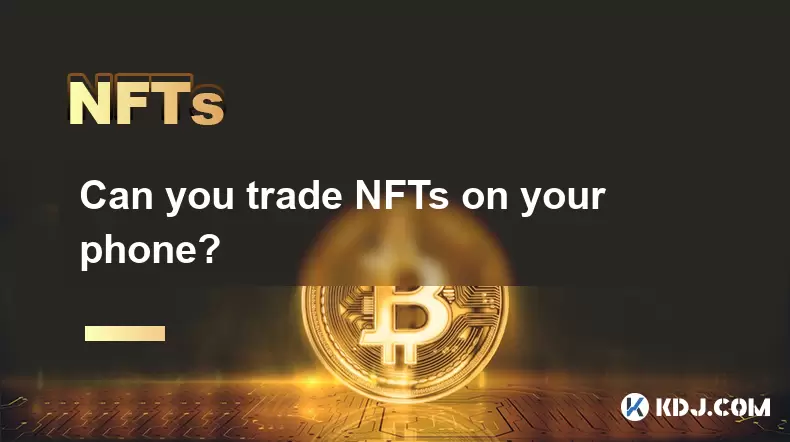
Can you trade NFTs on your phone?
Jul 18,2025 at 04:29am
Trading NFTs on Mobile DevicesYes, you can trade NFTs on your phone, and the process has become increasingly streamlined thanks to a variety of mobile...
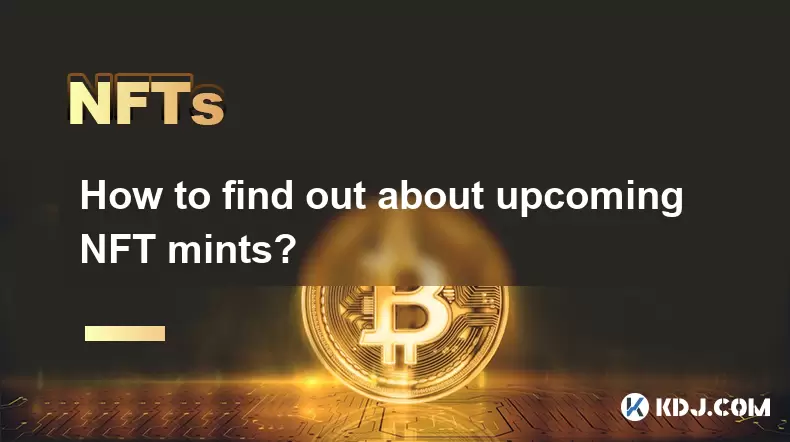
How to find out about upcoming NFT mints?
Jul 18,2025 at 11:50am
Exploring NFT Minting OpportunitiesUnderstanding the landscape of upcoming NFT mints is crucial for collectors, investors, and creators who wish to st...
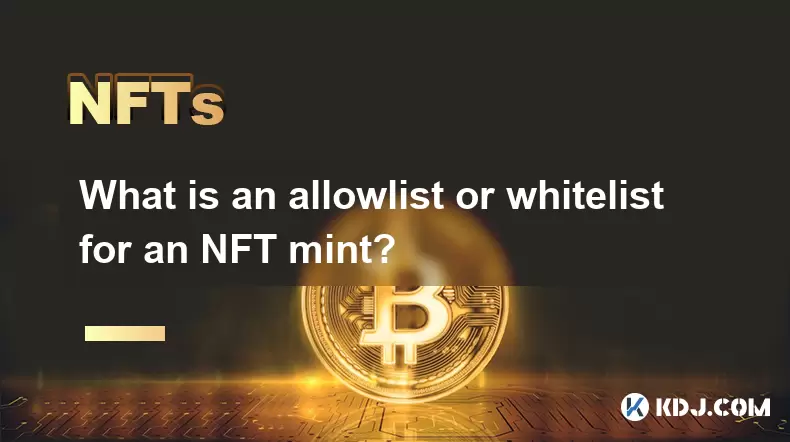
What is an allowlist or whitelist for an NFT mint?
Jul 20,2025 at 07:14pm
Understanding the Concept of an Allowlist for NFT MintingAn allowlist, also commonly referred to as a whitelist, is a mechanism used in the NFT mintin...

Is it possible to get a refund on an NFT?
Jul 21,2025 at 08:35pm
Understanding NFT Transactions and RefundsWhen you purchase an NFT (Non-Fungible Token), the transaction is typically recorded on a blockchain, making...

What happens to NFTs when the owner dies?
Jul 22,2025 at 02:43pm
Legal Ownership and Digital AssetsWhen an individual owns NFTs, the question of what happens to these assets upon their death is a pressing one. NFTs ...

What are the tax implications of gifting an NFT?
Jul 19,2025 at 04:21am
Understanding the Basics of NFT GiftingGifting a Non-Fungible Token (NFT) involves transferring ownership from one individual to another without recei...

Can you trade NFTs on your phone?
Jul 18,2025 at 04:29am
Trading NFTs on Mobile DevicesYes, you can trade NFTs on your phone, and the process has become increasingly streamlined thanks to a variety of mobile...

How to find out about upcoming NFT mints?
Jul 18,2025 at 11:50am
Exploring NFT Minting OpportunitiesUnderstanding the landscape of upcoming NFT mints is crucial for collectors, investors, and creators who wish to st...

What is an allowlist or whitelist for an NFT mint?
Jul 20,2025 at 07:14pm
Understanding the Concept of an Allowlist for NFT MintingAn allowlist, also commonly referred to as a whitelist, is a mechanism used in the NFT mintin...
See all articles

























































































